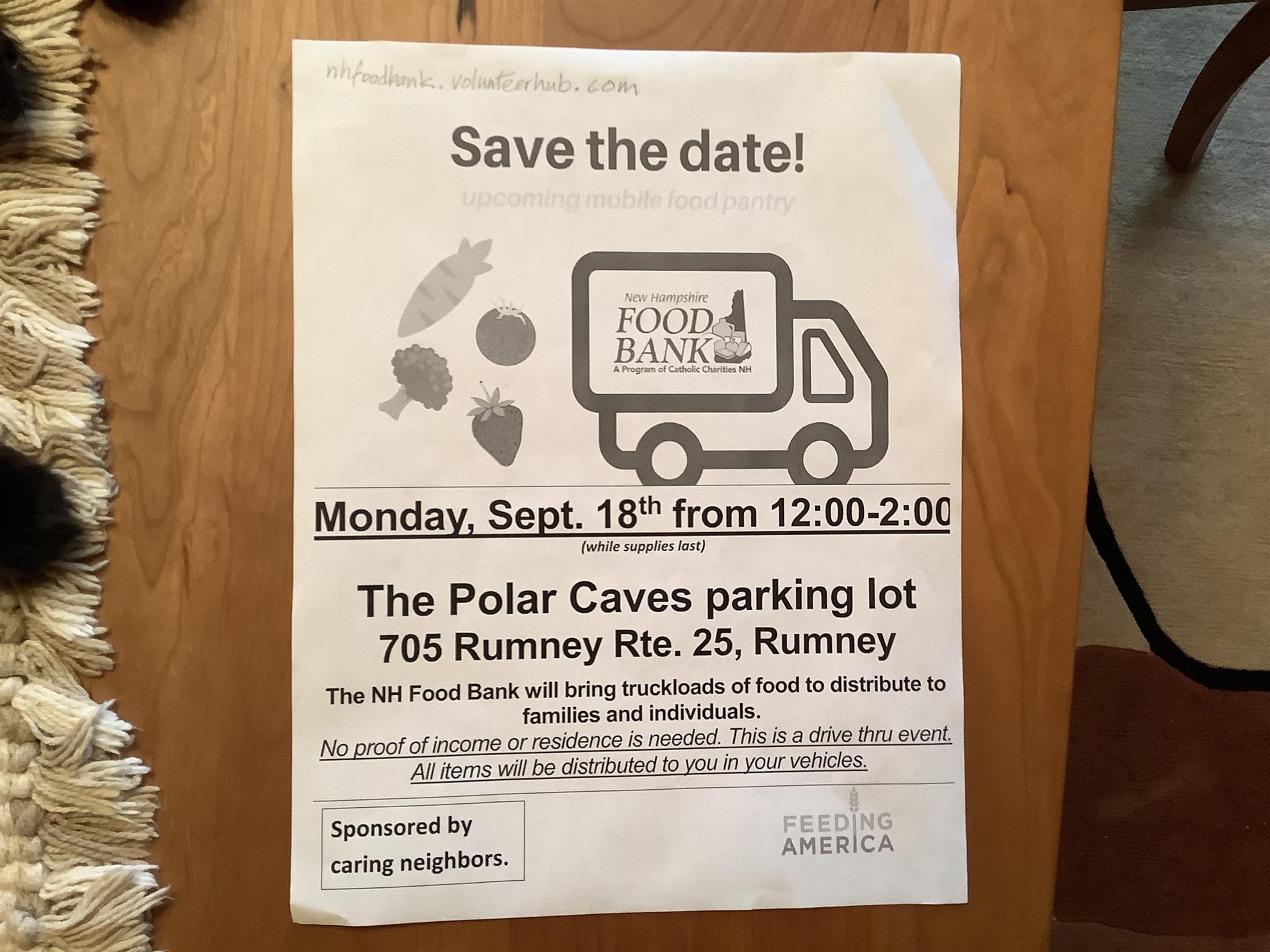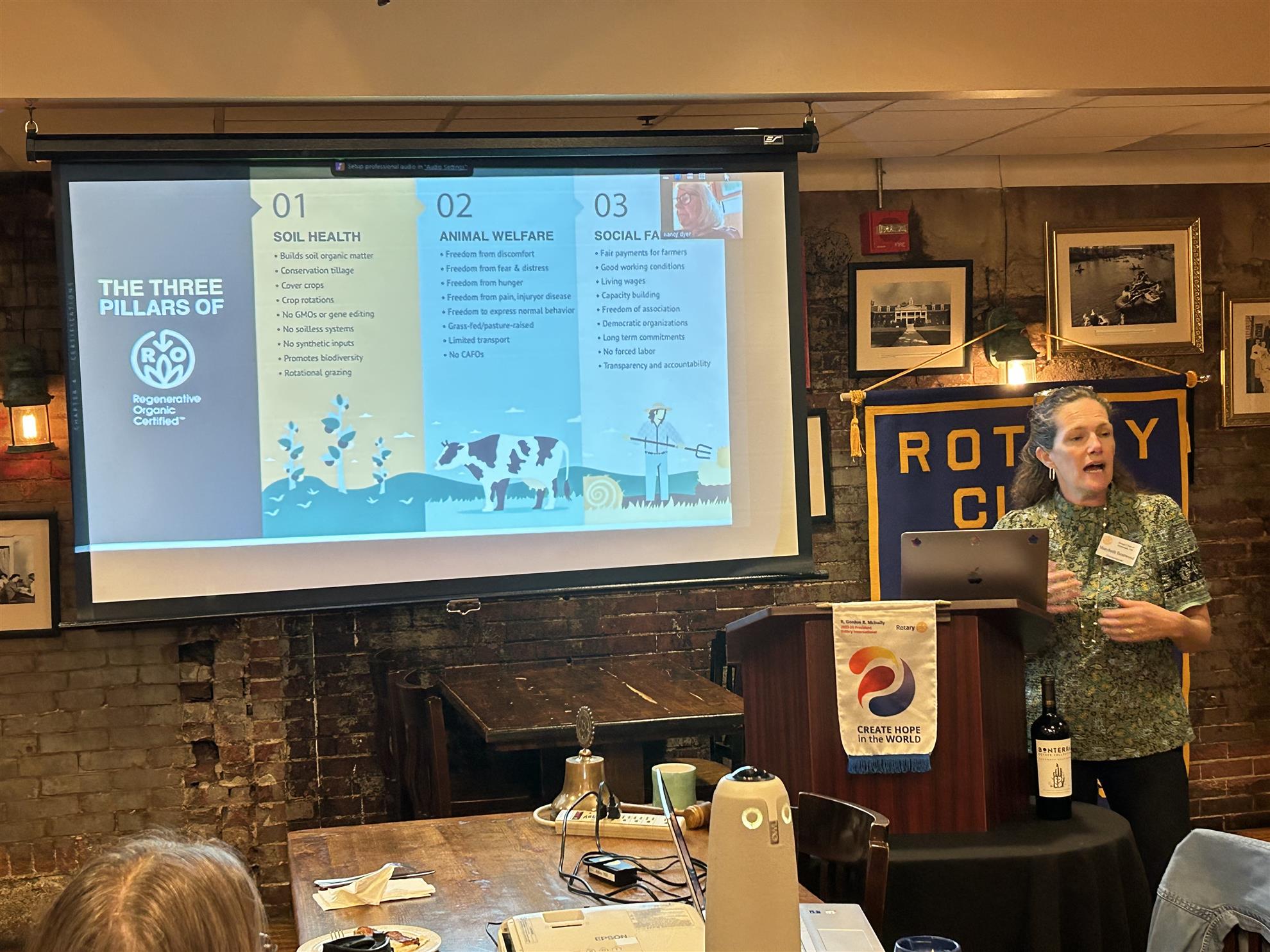September 13, 2023 Breakfast Meeting Notes
Tony was absent so Ben did a “mission moment.” He announced the 2025-26 Rotary International President will be Mario Cesar Martins de Camargo from Brazil. He has been a consultant to the print industry in Brazil and has served on the board of Casa de Esperancea, a hospital for children with disabilities.
Winner of the 50/50 was Bill.
Lora won the chance to draw in the card game but pulled the three of hearts. The game continues.
Business topics:
There will be a Board meeting this Friday morning.
There is a service opportunity this Monday for the New Hampshire Foodbank from 12-2 at the Polar Caves. You can go to the Foodbank’s volunteer portal to sign up (nhfoodbank.volunteerhub.com) Volunteers should arrive at 11 to help set up.

The Rotary Leadership Institute will hold sessions for our district and the district south of us at St. Johnesbury VT on October 28. RILNEA.org is the link to register. The district will pay for at least 2 members from every club to attend. This year’s course will be on succession planning.
We need to find someone else to write grants besides Beth. Every club needs one person to go through grant training each year. The next district training program for how to write a grant will be on November 11 in Lyndonville
Styrofoam updates: Ken W and Ken E are going to go to Gilford this morning to help load the densifier. Gilford just got an $8000 check for a full load of styrofoam!

Our speaker today was our own Marybeth Bentwood, peaking on climate change, wine and sustainability. The wine industry is a great model for adaptability and sustainability. Marybeth has been working with the wine industry for 20+ years in countries around the world. She is the spokesperson for Bonterra Organic Estates, (a division of Conca y Toro). Bonterra is the largest organic certified winery in the US.
Why wine? Wine itself has a low carbon footprint, but climate change is a huge concern because wine grapes will grow only in a very specific and limited geographic range, typically between 30-50 degrees N and S latitude. Winery work is very labor intensive, as grapes must be hand picked, hand tilled, and tend to grow on uneven ground so that the tasks cannot be mechanized. This means that employees are vital and employers need to be sure that they can attract and retain good people by having fair working practices, paying a better than living wage, and keeping lines of communication open between workers and management.
What is the value of wine? Wine was first fermented in Georgia in 6000 BC. Wine helps us to celebrate and provides a sense of community. Wine helps us to appreciate geography, as the terroir also reflects the unique climate and soil type of the wine. Wine also has the unique ability to age, that helps transport you through time and taste the effect of historic conditions on the beverage.
Wine has significant economic value. There is a $434 billion global market, of which $88 billion is in the US. There are 11,000 wineries in this country alone that employ 1.84 million Americans. Wine drives tourism…there is expected to be a $30 billion global market value by 2030.
Climate change has already started to affect the wine industry. In 2017 there were wildfires in every major wine growing region in the world. Pests and diseases are proliferating, causing rot and insect infestations. Drought in Spain led to dead vines, followed by floods. Frost in Burgundy has killed plants as well. As a consequence we are seeing wine appear in regions that previously could not produce it. Belgium has quadrupled its wine production in last 4 years. China is the world’s 5th largest market and the second largest grape grower. England’s chalky hills are suited to grow Champagne grapes. Japan, Netherlands, Poland, and Scandinavia are showing competitive wine production. We are now growing wine in Montana, Michigan, and Vermont, which previously couldn’t grow wine grapes. Even France is adapting. That country has many regulations for wine growers, including huge restrictions on what you grow and where, and when it is planted. Bordeaux has long had 6 approved varietals and just recently approved 6 new ones that are heat resistant.
Napa in CA is also looking further north to Mendocino county. This is the largest American viticulture area and has the largest percentage of organic estates. Marybeth works with Bonterra, which has been producing organic wine since 1988. The only demographic of wine consumption that is increasing is organic wine (millennials and Gen X look at the back of the label to determine how the wine is produced and its environmental and social impact rather than the front of the label to see what kind of wine it is!)
The Regenerative Organic Certification was created by Rodale, Patagonia, and Bronner soap to address climate change caused by agriculture. The 3 pillars of the certification are 1. soil health: no or low till, cover crops, crop rotation, no exposed soil, no synthetic inputs, promotion of biodiversity (owl boxes, sheep for weed control and fertilizer); 2 Animal welfare: freedom from discomfort, pain etc. and 3. Social fairness: good working conditions, fair payment for farmers, procedures for grievances, fair payment for employees. Higher pay allows wineries to retain skilled employees which ultimately lowers cost.
Note that advertising for organic products does rely on buzz words which don’t necessarily mean that the products are good for the planet. “Regenerative” is a word that refers to attention to soil but there is no real definition of what it means. Certified organic means that the maker is trying to do good things but doesn’t guarantee that they aren’t also doing bad things. Regenerative Organic Certification is the gold standard.
Organic practices helps the soil to hold more water, which helps prevent erosion. Electric vehicles and tractors, rather than gasoline powered, help reduce carbon footprint. Biofilters (red worms) are used to filter the water. Rootstocks are selected for heat tolerance. The orientation of rows of grapes has been changed from north to south to northeast to southwest. Canopies shade the plants and so prolong the growing season.
The majority of the carbon footprint of the wine industry is in the packaging, so they aim to have lightweight bottles and cartons. Wineries are experimenting with cans, flat bottles, and paper bottles with plastic liners. They partner with other organizations to do government-level advocacy and work with distributors and other wineries to brainstorm ways to reduce weight of bottles and packaging.
Happy dollars: Mike and Denise shared happy dollars.
Respectfully submitted,
Lora Miller, secretary